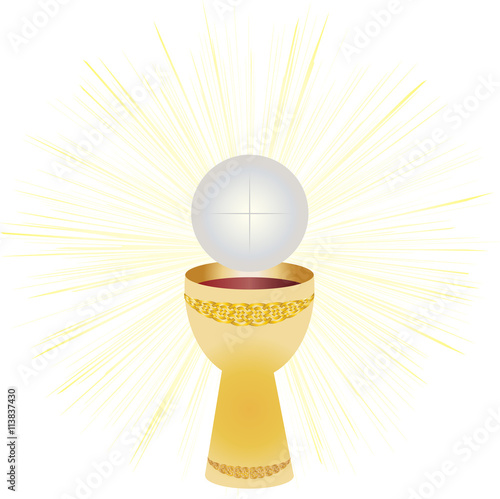Welcome Back to Banquet of the Word!
Join us every week for background on the Sunday readings.
Our mission is simple: We want to help everyone in “pew-land” get more out of mass. Because it’s fun to feel smart about scripture.
Today’s theme:
Today we celebrate the most sacred part of our faith: The Eucharist. The theme could also be viewed as OLD covenant, NEW covenant. The OLD covenant was finite and temporary. The NEW covenant is infinite and everlasting.

DEUTERONOMY 8:2-3, 14B-16A
(The 1st Reading is Old Testament. It always links to the Gospel.)
In this reading, Moses reminds the people of all the great works God did for his people, specifically the manna in the desert. He said that food was “A food unknown to your fathers.” He says that twice, in fact. Why is that repeated? What does it mean?
God made a covenant with the Old Testament people. A covenant is like a marriage vow. It is permanent and forever. Just as a husband woos his bride, God, in a sense, “wooed” his people – his “bride” Israel. He showed them his mighty arm as he saved them from Egypt, split the sea, and sent manna as food and water from the rock. The covenant – the wedding vow between God and his people – was the 10 commandments.
All these things, however, are incomplete and temporary. They gave the Israelites a glimpse of what was to come in the NEW covenant, the one Jesus established on the cross. The one we participate in when we approach the Banquet of the Eucharist at every mass.
Moses said to the people:
“Remember how for forty years now the LORD, your God,
has directed all your journeying in the desert,
so as to test you by affliction
and find out whether or not it was your intention
to keep his commandments.
He therefore let you be afflicted with hunger,
and then fed you with manna,
a food unknown to you and your fathers,
in order to show you that not by bread alone does one live,
but by every word that comes forth from the mouth of the LORD.“Do not forget the LORD, your God,
who brought you out of the land of Egypt,
that place of slavery;
who guided you through the vast and terrible desert
with its saraph serpents and scorpions,
its parched and waterless ground;
who brought forth water for you from the flinty rock
and fed you in the desert with manna,
a food unknown to your fathers.”
Psalm 147: “Praise the Lord Jerusalem”
(The Psalm is a “response” to what we heard in the 1st Reading)
1 CORINTHIANS 10:16-17
(The 2nd reading is usually one of Paul’s letters. It speaks to how the early church built The Church after the passion, death and resurrection).
This week the reading is short:
Brothers and sisters:
The cup of blessing that we bless,
is it not a participation in the blood of Christ?
The bread that we break,
is it not a participation in the body of Christ?
Because the loaf of bread is one,
we, though many, are one body,
for we all partake of the one loaf.
Ultimately, this summarizes for us what our Catholic faith is to us: It is the Eucharist, which is the SOURCE and SUMMIT of our faith.
Paul wrote to an audience in Corinth that did not have full 100% understanding of the Eucharist. Many faithful still practiced Old Testament practices. There was confusion.
Here Paul speaks clearly and re-iterates that when we partake of the Eucharist, we participate in the New Covenant Jesus left. The one he instituted at the Last Supper. The one that opens the gates of Heaven for us as we aim for eternal life.
Gospel: John 6:51-58
(The Gospel is the highest point of the Liturgy of the Word. That’s why we stand.
We are about to hear from and be instructed by Christ Himself.)
Arguably one of the most contentious speeches in John’s gospel, we are in John 6. This is known as the Bread of Life Discourse. As Catholics, we take Jesus’s command to eat his body and drink his blood literally. This command is not symbolic. Why?
In the Old Testament, Jewish believers showed their faithfulness to God by doing as God commanded – by eating the flesh of an unblemished, sacrificed lamb. That was how the people showed that they were a covenant people.
This OLD Testament act was incomplete in a sense,
meaning more would come when Jesus entered the picture and walked the earth.
The NEW Covenant ushered in by Christ fulfills the OLD. That happened at the Last Supper.
Jesus commanded the disciples to eat his flesh and drink his blood instead of that of a lamb – because He IS that sacrificial lamb. He turned the page from the OLD covenant to the NEW. The old is gone, and the new is here until Jesus comes again.
We are called to participate with Jesus at the Last Supper when we attend mass. We do not, as some suppose “re-kill” Jesus at mass each week. Through Divine Intervention, we are all transported back to that same Last Supper. We are united with Christ in the upper room, with all who have gone before us, and with all the saints and angels
Today, let us give thanks and praise to God for the gift of the New Covenant, the body and blood of our Lord Jesus Christ! May it lead us to eternal life with Him in Heaven.
